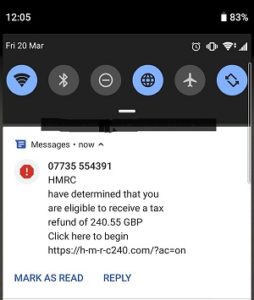There have been 105 reports of coronavirus-related fraud since 1 February 2020, according to the UK fraud and cyber-crime reporting centre.
Action Fraud said that total losses have reached nearly £970,000 ($1.1m, €1m).
The first report the centre received relating to coronavirus, or covid-19, was on 9 February, with 21 in total during the month.
There have been 84 reports in March, with 46 coming between 1 March and 13 March, and 38 between 14 March and 18 March.
Types of scams
The majority are related to online shopping scams, where people have ordered protective face masks, hand sanitiser, and other products, which have never arrived.
Others include; ticket fraud, romance fraud, charity fraud and lender loan fraud.
Action Fraud has also received over 200 reports of coronavirus-themed phishing emails.
These attempt to trick people into opening malicious attachments which could lead to fraudsters stealing people’s personal information, email logins and passwords, and banking details.
Tactics
Some of the tactics being used in phishing emails include:
- Fraudsters pretending to be from a research group that mimic the Centre for Disease Control and Prevention (CDC) and World Health Organisation (WHO). They claim to provide the victim with a list of active infections in their area, but to access this information the victim needs to either: click on a link which redirects them to a credential-stealing page; or make a donation of support in the form of a payment into a bitcoin account;
- Fraudsters providing articles about the virus outbreak with a link to a fake company website where victims are encouraged to click to subscribe to a daily newsletter for further updates;
- Fraudsters sending investment scheme and trading advice encouraging people to take advantage of the coronavirus downturn; and
- Fraudsters pretending to be from HM Revenue and Customs (HMRC) offering a tax refund and directing victims to a fake website to harvest their personal and financial details. The emails often display the HMRC logo making it look reasonably genuine and convincing.
Be careful
An International Adviser journliast received this text message below just as this article was published.

“These frauds try to lure you in with offers that look too good to be true, such as high return investments and ‘healthcare opportunities’, or appeals for you to support those who are ill or bogus charities,” Graeme Biggar, director general of the National Economic Crime Centre, said.
“The advice is simple, think very carefully before you hand over your money, and don’t give out your personal details unless you are sure who you are dealing with.
“We are working together across law enforcement, government and the private sector to combat this criminal activity and protect the public. If you think you have been a victim please report to Action Fraud.”
Tom Selby, senior analyst at AJ Bell, said: “While the country hunkers down in the hope of slowing the spread of coronavirus, the economic fallout will inevitably lead to an increase in the number of vulnerable or potentially vulnerable people in the UK.
“In such an environment, unscrupulous scammers will already be plotting ways to take advantage during what for many will be a time of serious financial strain.
“Scams claiming to allow people early access to their retirement pots could come back to the fore if we see a surge in unemployment placing immediate pressure on household incomes.”








